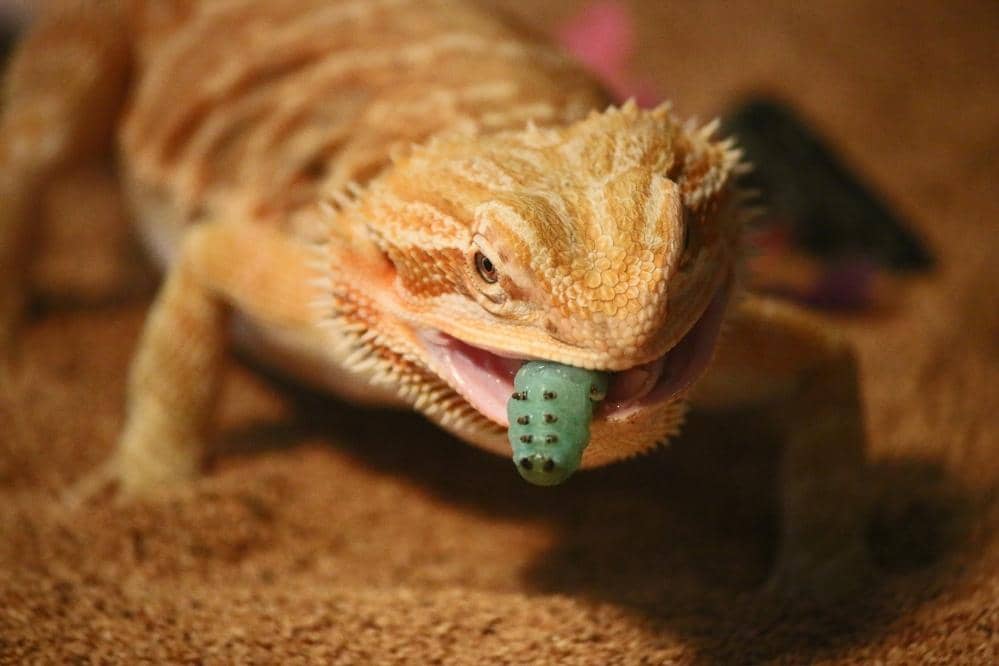Every living organism needs to eat food to get the energy required to carry out the body’s internal metabolic functions and other routine activities to survive. No animal will deliberately starve itself, and bearded dragons are no exception. Yes, bearded dragons never starve themselves at will. If your bearded friend is not eating, there must be something wrong with him, and you need to sort the issue as soon as possible to ensure his wellbeing. However, some normal conditions exist when bearded dragons eat less or stop eating temporarily.
As a novice beardie’s owner, you may wonder, “how can I come to know that my bearded dragon is fasting as normal behavior or there is an issue with him?” or when i should be concerned that it’s been too long since my bearded dragon ate? Reading till the end will help you to understand the topic. Before delving into why your bearded dragon is going off feed, it is worth discussing the normal eating habits of bearded dragons.
Normally How Often Do Bearded Dragons Eat?
You will be able to identify immediately that your bearded dragon is fasting more than usual between the meals only if you know the normal eating routine of your beardie. Surprisingly eating habits of bearded dragons vary significantly during different phases of life. So the interval between meals (at which you should be concerned) is different in each phase. The following table indicates the eating frequency of bearded dragons at different ages.
| Age In Months | No. of Meals Per Day |
| Up to 3 | 5 |
| 3 – 6 | 3 |
| 7 – 12 | 2 |
| Above 1 year | 1 |
Reasons for Bearded Dragon Not Eating Food
1. Change of House
We know that bearded dragons are extremely solitary by instinct, sensitive to their home environment, and don’t accept any change in their surrounding environment. Your bearded dragon can stop eating if you entirely change its enclosure. Even If you make minor changes inside the chamber, like adding a new toy, branch, hide, etc., or merely changing the chamber’s location can make your bearded friend go off-feed.
However, this situation is temporary, and your beardie will return to its normal eating schedule as soon as he is accustomed to new settings. If this situation continues for more than two weeks, contact a vet.
2. Lower Temperature Inside The Chamber
For adult beardies, the required basking temperature is 90-95 degrees Fahrenheit, and for baby beardies, it ranges from 95-110 degrees Fahrenheit. They need heat to digest food, so if the temperature is below the recommended range, they will undoubtedly lose their desire to eat. The lower temperature also affects their overall activities, making them lazy, lethargic, and sleepy. Correcting the temperature will heal the situation immediately.
However, you may need a vet if you are too late to make corrections.
3. Insufficient Light (UVA & UVB)
In addition to temperature and heat, the bearded dragons also need UVA & UVB light to digest their food properly. UVA & UVB is also required to absorb vitamin D, which is crucial for bone strength and development. So if you are not providing sufficient light, they will not be able to digest food properly and absorb vitamin D. In the end, your beardie will be off-feed, weak, lazy, and unable to walk or hunt properly.
4. Stress & Anxiety
If your bearded dragon is not comfortable in his chamber, he will not eat appropriately. He may feel stressed because of a sudden change in the surroundings, another lizard nearby, loud noise, and children or other pets hovering around and disturbing him. So if your beardie is starving without apparent reason, look for potential stress factors. Removing the stressor and calming your beardie will improve the situation immediately.
5. Sudden Change In Diet / Feeding Wrong Diet
If you are thinking of changing the diet of your beardie, be prepared for weeks of confrontation. When it comes to food, the bearded dragons are notoriously obstinate and can fast for weeks or even months. If you give up, they will remember it and resist more intensely in the future. Therefore, it is recommended to stick with it and doesn’t get panic; eventually, they will start eating new food.
On the other hand, providing the right food according to age is crucial. Although they are omnivores, beardies mostly eat insects and a few vegetables only. Unlike other omnivorous animals, bearded dragons can’t eat meat, fish, dairy products, etc.
6. Brumation
For novice bearded dragon owners, brumation is the hibernation of the reptile world. During this period, bearded dragons spend most of their time sleeping and resting and are not interested in eating. However, in between, they wake up for a short period to drink water after every few days. In wild conditions, bearded dragons usually brumate during winter and generally stay in this phase for a few weeks to two months.
So in captivity, if the temperature remains below the recommended level for a long duration, it can induce brumation. Your beardie will be inactive or sleepy and will not eat food. So you must be able to identify whether your bearded friend is actually brumating or fasting due to any other reason.
7. Impaction
Another common condition that can make your bearded dragon go off-feed is impaction. Impaction is the blockage of the digestive tract and usually happens when your beardie eats something wrong or food bite size is too big for him. It’s a painful condition, and beardie is reluctant to move and doesn’t eat food. You can easily differentiate between brumation and impaction by two factors. First, if the temperature is correct and your beardie is inactive and off-feed, then its impaction because they brumate only when the temperature is on the cooler side. Secondly, in brumation, appetite decreases gradually while an impacted beardie will stop eating suddenly. So if you suspect your bearded friend is impacted, take him to the vet immediately.
8. Sickness
If everything inside the enclosure is Ok, and your bearded dragon is still not eating, he may be sick. In such a case, get an appointment with a vet and get your friend screened.
How Long Can a Bearded Dragon Survive Without Eating?
Generally, beardies in captivity are fed healthier and larger amounts of food than in the wild. So a healthy adult bearded dragon has enough fat reserves to survive for two months without eating. However, they still need to drink water during this period. However, it is not recommended to starve your bearded friend for a prolonged duration.
How To Make A Bearded Dragon To Eat?
You can take the following steps to make your bearded dragon eat.
- Ensure that the temperature inside the container is correct and light bulbs are working correctly.
- Offer them the feed they like.
- Remove all potential stress factors, whether inside or outside the chamber.
- Change the vegetable after some time because, like humans, bearded dragons also get bored eating the same food repeatedly.
- You can use an appetite stimulant.
- If they resist eating, hold your ground and never give up unless they are severely malnourished or extremely weak.
Final Words
We can surely say that, like other animals, bearded dragons will not starve themselves without reason. There are many possible reasons if your beardie is off-feed. Most of them are not a matter of great concern and heal on their own after some time or need a minor adjustment. However, sometimes your bearded friend will need your attention and medical care.
We hope this article has improved your understanding of “why bearded dragons starve and how you can handle it?”

